Source:Xinhua 2015年08月10日 12:08
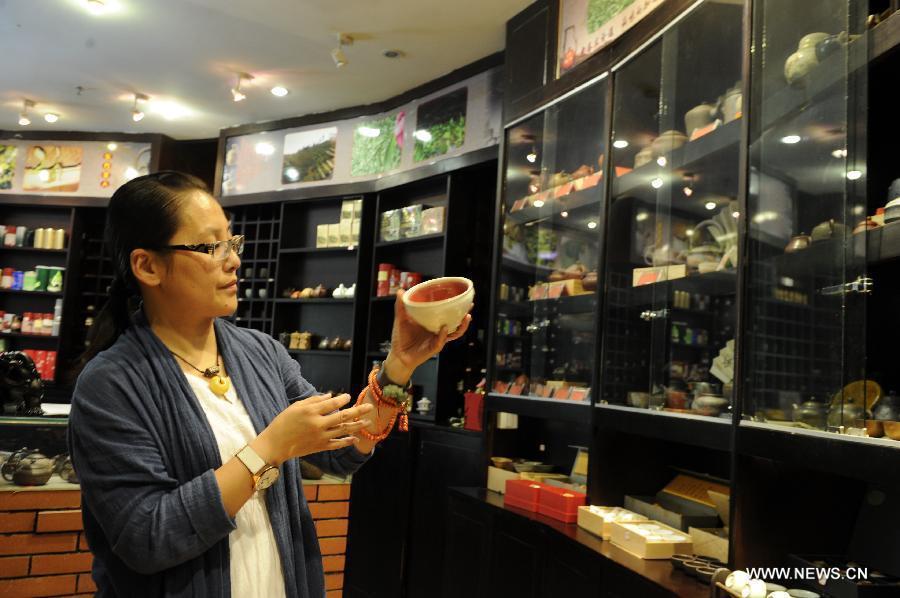
Yu Ya Chi introduces a delicate tea bowl to a costumer at her teahouse in Lhasa, capital of southwest China's Tibet Autonomous Region, Aug. 7, 2015. Entering Yu Ya Chi's Yushan Taiwan Tea House in Lhasa, people could be attracted by its quiet environment, decent tea ceremony and the flavour of Taiwan oolong tea. Coming from Taichung City of southeast China's Taiwan, Yu Ya Chi has been in Lhasa for 12 years. She is able to speak fluent Tibetan language and fully know about buddhist culture. Yu also pray at the Potala Palace with local Tibetan residents and read Tibetan and Buddhist books like a real Tibetan resident. To open a teahouse came as Yu Ya Chi found that her hometown's Taiwan black tea culture was quite different from that in Tibet, in which brick tea are used to make Tibetan butter tea or sweet tea. Yu finally started a teahouse so as to introduce Taiwan tea culture, which is featured with high-quality black tea and delicate tea wares. To guarantee the quality of the tea, Yu flies to Taiwan several times every year to select the best for the tea house. Her customers have both Han and Tibetan people. Her teahouse, different from those noisy ones, delivers a tranquil atmosphere. (Xinhua/Zhang Rufeng)
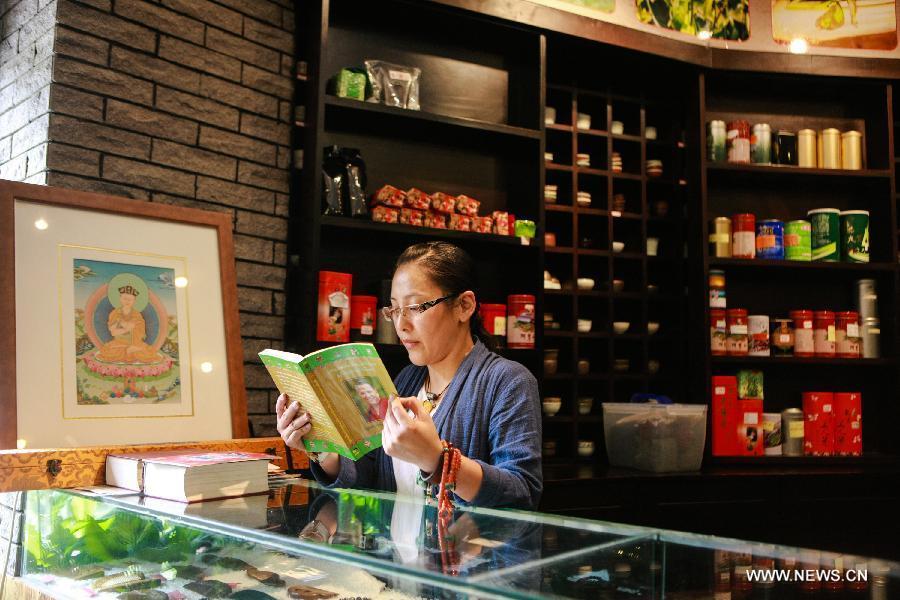
Yu Ya Chi read Tibetan books at her teahouse in Lhasa, capital of southwest China's Tibet Autonomous Region, Aug. 7, 2015. Entering Yu Ya Chi's Yushan Taiwan Tea House in Lhasa, people could be attracted by its quiet environment, decent tea ceremony and the flavour of Taiwan oolong tea. Coming from Taichung City of southeast China's Taiwan, Yu Ya Chi has been in Lhasa for 12 years. She is able to speak fluent Tibetan language and fully know about buddhist culture. Yu also pray at the Potala Palace with local Tibetan residents and read Tibetan and Buddhist books like a real Tibetan resident. To open a teahouse came as Yu Ya Chi found that her hometown's Taiwan black tea culture was quite different from that in Tibet, in which brick tea are used to make Tibetan butter tea or sweet tea. Yu finally started a teahouse so as to introduce Taiwan tea culture, which is featured with high-quality black tea and delicate tea wares. To guarantee the quality of the tea, Yu flies to Taiwan several times every year to select the best for the tea house. Her customers have both Han and Tibetan people. Her teahouse, different from those noisy ones, delivers a tranquil atmosphere. (Xinhua/Zheng Huansong)
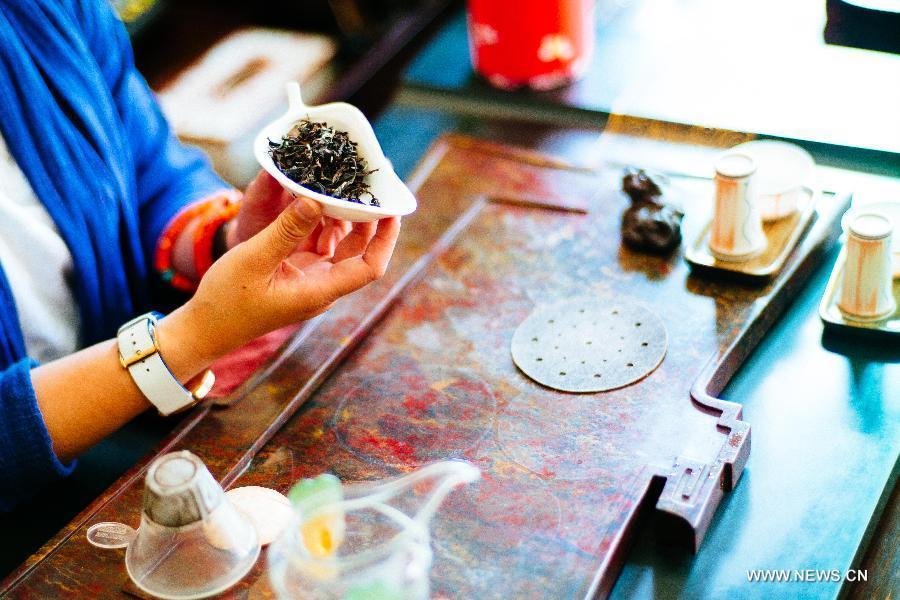
Yu Ya Chi displays tea ceremony at her teahouse in Lhasa, capital of southwest China's Tibet Autonomous Region, Aug. 7, 2015. Entering Yu Ya Chi's Yushan Taiwan Tea House in Lhasa, people could be attracted by its quiet environment, decent tea ceremony and the flavour of Taiwan oolong tea. Coming from Taichung City of southeast China's Taiwan, Yu Ya Chi has been in Lhasa for 12 years. She is able to speak fluent Tibetan language and fully know about buddhist culture. Yu also pray at the Potala Palace with local Tibetan residents and read Tibetan and Buddhist books like a real Tibetan resident. To open a teahouse came as Yu Ya Chi found that her hometown's Taiwan black tea culture was quite different from that in Tibet, in which brick tea are used to make Tibetan butter tea or sweet tea. Yu finally started a teahouse so as to introduce Taiwan tea culture, which is featured with high-quality black tea and delicate tea wares. To guarantee the quality of the tea, Yu flies to Taiwan several times every year to select the best for the tea house. Her customers have both Han and Tibetan people. Her teahouse, different from those noisy ones, delivers a tranquil atmosphere. (Xinhua/Liu Jinhai)
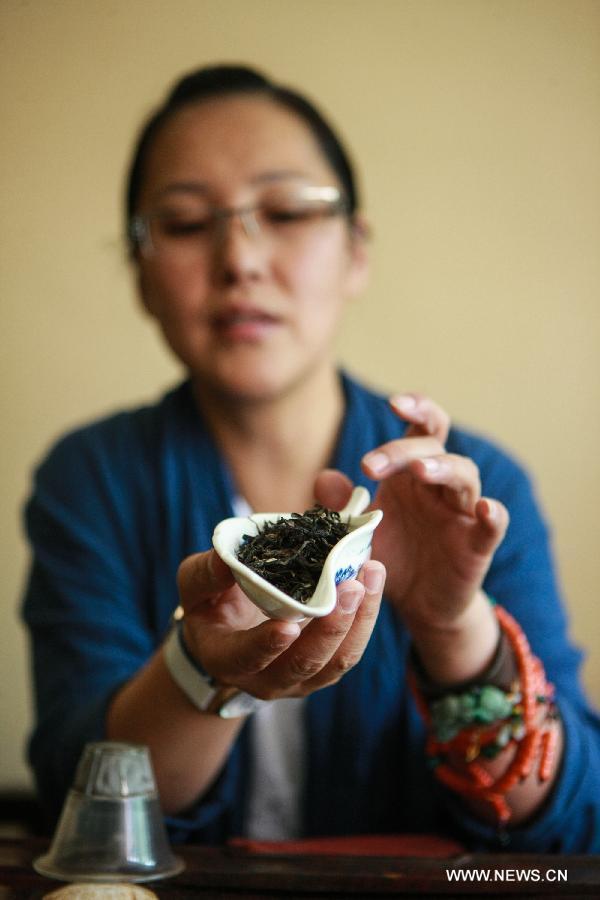
Yu Ya Chi introduces Taiwan tea to customers at her teahouse in Lhasa, capital of southwest China's Tibet Autonomous Region, Aug. 7, 2015. Entering Yu Ya Chi's Yushan Taiwan Tea House in Lhasa, people could be attracted by its quiet environment, decent tea ceremony and the flavour of Taiwan oolong tea. Coming from Taichung City of southeast China's Taiwan, Yu Ya Chi has been in Lhasa for 12 years. She is able to speak fluent Tibetan language and fully know about buddhist culture. Yu also pray at the Potala Palace with local Tibetan residents and read Tibetan and Buddhist books like a real Tibetan resident. To open a teahouse came as Yu Ya Chi found that her hometown's Taiwan black tea culture was quite different from that in Tibet, in which brick tea are used to make Tibetan butter tea or sweet tea. Yu finally started a teahouse so as to introduce Taiwan tea culture, which is featured with high-quality black tea and delicate tea wares. To guarantee the quality of the tea, Yu flies to Taiwan several times every year to select the best for the tea house. Her customers have both Han and Tibetan people. Her teahouse, different from those noisy ones, delivers a tranquil atmosphere. (Xinhua/Zheng Huansong)
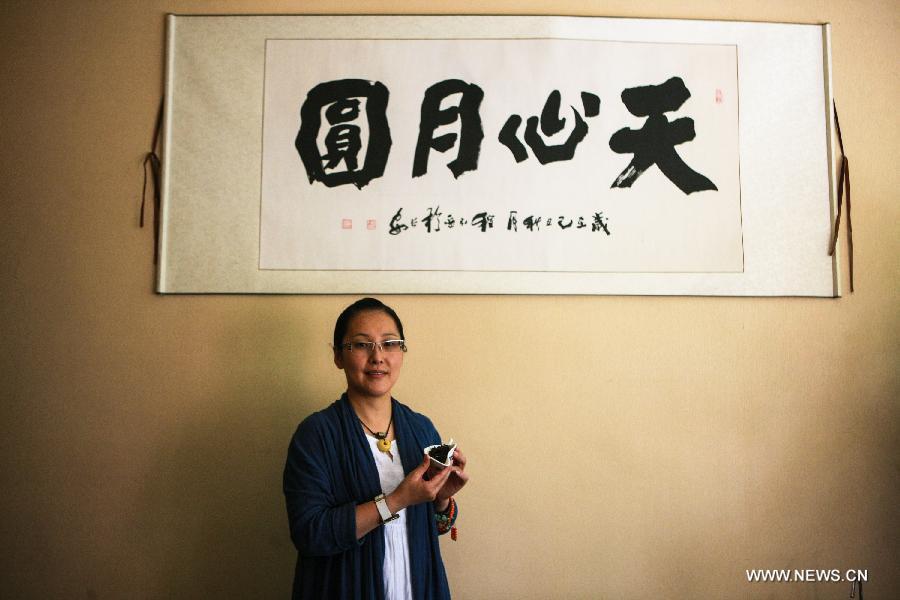
Yu Ya Chi introduces Taiwan tea to customers at her teahouse in Lhasa, capital of southwest China's Tibet Autonomous Region, Aug. 7, 2015. Entering Yu Ya Chi's Yushan Taiwan Tea House in Lhasa, people could be attracted by its quiet environment, decent tea ceremony and the flavour of Taiwan oolong tea. Coming from Taichung City of southeast China's Taiwan, Yu Ya Chi has been in Lhasa for 12 years. She is able to speak fluent Tibetan language and fully know about buddhist culture. Yu also pray at the Potala Palace with local Tibetan residents and read Tibetan and Buddhist books like a real Tibetan resident. To open a teahouse came as Yu Ya Chi found that her hometown's Taiwan black tea culture was quite different from that in Tibet, in which brick tea are used to make Tibetan butter tea or sweet tea. Yu finally started a teahouse so as to introduce Taiwan tea culture, which is featured with high-quality black tea and delicate tea wares. To guarantee the quality of the tea, Yu flies to Taiwan several times every year to select the best for the tea house. Her customers have both Han and Tibetan people. Her teahouse, different from those noisy ones, delivers a tranquil atmosphere. (Xinhua/Zheng Huansong)
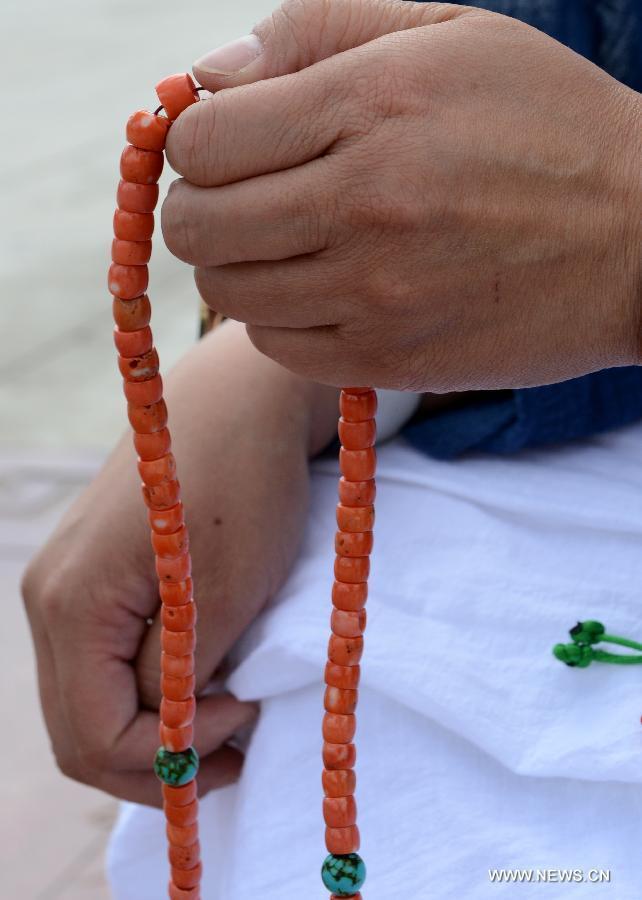
Yu Ya Chi holds a string of Buddha beads as she walks on a street in Lhasa, capital of southwest China's Tibet Autonomous Region, Aug. 7, 2015. Entering Yu Ya Chi's Yushan Taiwan Tea House in Lhasa, people could be attracted by its quiet environment, decent tea ceremony and the flavour of Taiwan oolong tea. Coming from Taichung City of southeast China's Taiwan, Yu Ya Chi has been in Lhasa for 12 years. She is able to speak fluent Tibetan language and fully know about buddhist culture. Yu also pray at the Potala Palace with local Tibetan residents and read Tibetan and Buddhist books like a real Tibetan resident. To open a teahouse came as Yu Ya Chi found that her hometown's Taiwan black tea culture was quite different from that in Tibet, in which brick tea are used to make Tibetan butter tea or sweet tea. Yu finally started a teahouse so as to introduce Taiwan tea culture, which is featured with high-quality black tea and delicate tea wares. To guarantee the quality of the tea, Yu flies to Taiwan several times every year to select the best for the tea house. Her customers have both Han and Tibetan people. Her teahouse, different from those noisy ones, delivers a tranquil atmosphere. (Xinhua/Chogo)
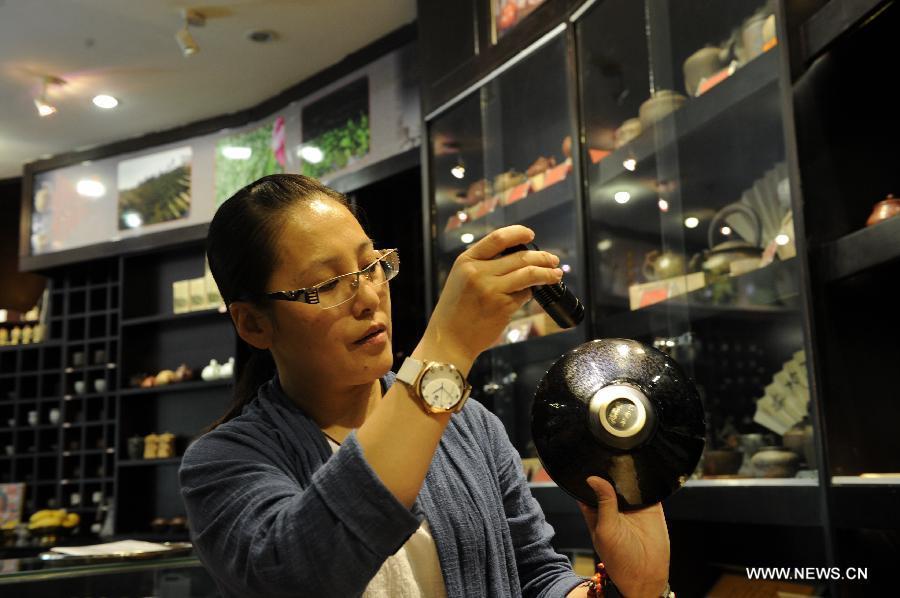
Yu Ya Chi introduces a delicate tea bowl at her teahouse in Lhasa, capital of southwest China's Tibet Autonomous Region, Aug. 7, 2015. Entering Yu Ya Chi's Yushan Taiwan Tea House in Lhasa, people could be attracted by its quiet environment, decent tea ceremony and the flavour of Taiwan oolong tea. Coming from Taichung City of southeast China's Taiwan, Yu Ya Chi has been in Lhasa for 12 years. She is able to speak fluent Tibetan language and fully know about buddhist culture. Yu also pray at the Potala Palace with local Tibetan residents and read Tibetan and Buddhist books like a real Tibetan resident. To open a teahouse came as Yu Ya Chi found that her hometown's Taiwan black tea culture was quite different from that in Tibet, in which brick tea are used to make Tibetan butter tea or sweet tea. Yu finally started a teahouse so as to introduce Taiwan tea culture, which is featured with high-quality black tea and delicate tea wares. To guarantee the quality of the tea, Yu flies to Taiwan several times every year to select the best for the tea house. Her customers have both Han and Tibetan people. Her teahouse, different from those noisy ones, delivers a tranquil atmosphere. (Xinhua/Zhang Rufeng)